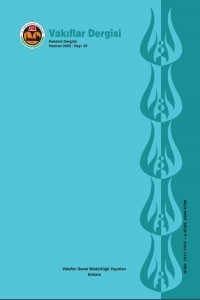Abstract
Although the autonomous positions of waqf, which is one of the important features of decentralization, weakened as a result of the centralization policies that began to be implemented after Tanzimat, the awqaf continued to maintain their importance in the social and economic life of the society. In this period, there are many awqaf in Siverek, mainly belonging to mosques and other place of worship owned by Muslims and non-Muslims and endowed for both charitable purposes and filial conditions. This study asserts that the awqaf in Siverek continued to maintain their roles in the society considering their diversity and functionality even in the time when decentralization policies were implemented. This article attempts to reveal the problems of the awqaf in Siverek, which gave clues to the social mentality of the post-Tanzimat era, on the basis of the Sherʻiyye registers.
References
- KAYNAKÇA
- Arşiv Vesikaları
- BOA.NFS. d.2703,1258-1843-44 s.57-58.
- 443 No’lu Siverek Şer’iye Sicili, (Başlama Tarihi: H.1268, Bitiş Tarihi: H.1269).
- 438 No’lu Siverek Şer’iye Sicili, (Başlama Tarihi: H.1283, Bitiş Tarihi: H.1284).
- 441 No’lu Siverek Şer’iye Sicili, (Başlama Tarihi: H. 1285, Bitiş Tarihi: H.1290).
- 440 No’lu Siverek Şer’iye Sicili, (Başlama Tarihi: H.1288, Bitiş Tarihi: H.1297).
- 444 No’lu Siverek Şer’iye Sicili, (Başlama Tarihi: H.1288, Bitiş Tarihi: H.1298)
- 445 No’lu Siverek Şer’iye Sicili, (Başlama Tarihi. H.1306, Bitiş Tarihi: H.1309).
- Kitap ve Makaleler
- Akgündüz, Ahmet (2013). İslam Hukukunda ve Osmanlı Tatbikatında vakıf Müessesi, İstanbul: Osmanlı Araştırmaları Vakfı Yay.
- Barkan, Ömer Lütfi (1940). “Şer’i Miras Hukuku ve Evlatlık Vakıflar”, İstanbul Üniversitesi Hukuk Fakültesi Mecmuası, Cilt.6 Sayı.1, s.168-181.
- Berki, Ali Himmet (1969). “Vakıflar ve Vakıfların Maruz Kaldığı Tecavüz ve İhmaller.” Vakıflar Dergisi, Sayı.VIII, s.335-340
- Berki, Şakir (1969) “Vakfın Mahiyeti”, Vakıflar Dergisi, Sayı. VIII, , s.1-7.
- Bilmen, Ömer Nasuhi (1999). Hukuk-ı İslamiyye ve Istılahat-ı Fıkhiyye Kamusu, İstanbul: Bilmen Basın ve Yayınevi.
- Çatalacalı Ali Efendi(1324). Fetavay-ı Ali Efendi (Fetavay-ı Feyziyye ile Birlikte) Dersaadet: Naşir Muhammed Mehdi.
- ez-Zerka, Ahmet Mustafa (1993). Çağdaş Yaklaşımla İslam Hukuku, Ter. Servet Armağan, İstanbul: Timaş Yay.
- Hilmi Efendi, Ömer (1977). İthafu’l-ahlaf fi ahkâmi’l-evkâf, Ankara: Vakıflar Genel Müdürlüğü Yay.
- Kozak İ.Erol (1985) Bir Sosyal Siyaset Müessesi Olarak Vakıf, İstanbul: Akabe Yay.
- Köprülü, M. Fuat (1942). “Vakıf Müessesesinin Hukuki Mahiyeti ve Tarihi Tekâmülü”, Vakıflar Dergisi, Sayı. II, s.1-35.
- Özkaya, H. Gökçen (2010) “Vakıf İstibdal Kayıtları, İstanbul’da Barınma Kültürü ve Kent Yapısına Dair Neler Sunar?”, Türkiye Araştırmaları Literatür Dergisi, Cilt 8, Sayı. 16, s.467-488.
- Pakalın, Mehmet Zeki (1983). Osmanlı Tarih Deyimleri ve Terimleri Sözlüğü, İstanbul: Milli Eğitim Basımevi.
- Yediyıldız, Bahaeddin (2003). XVIII. Yüzyılda Türkiye’de Vakıf Müessesesi, Ankara: Türk Tarih Kurumu Yay.
Abstract
Tanzimat sonrasında uygulanmaya başlanan merkezileşme politikaları
sonucunda, adem-i merkeziyetin önemli unsurlarından olan vakıfların özerk
konumları zayıflasa da, vakıflar toplumun sosyal ve iktisadi hayatındaki
önemlerini korumaya devam etmişlerdir. Bu
dönemde Siverek’te başta camiler ve diğer ibadet kurumlarına ait olmak üzere
hem hayır cihetine hem de evlada şart kılınmış Müslümanlara ve gayrimüslimlere
ait birçok vakıf vardır. Bu çalışma merkeziyetçi politikaların uygulandığı
dönemde de Siverek’teki vakıfların çeşitliliği ve işlevselliğinden hareketle toplumdaki
rollerinin devam ettiğini iddia etmektedir. Bu makale Siverek’te Tanzimat
sonrası dönemin sosyal zihniyetinin ipuçlarını veren vakıfların mahkemelere
yansıyan problemlerini Şeri’yye sicillerini temel alarak ortaya koymayı
denemektedir.
References
- KAYNAKÇA
- Arşiv Vesikaları
- BOA.NFS. d.2703,1258-1843-44 s.57-58.
- 443 No’lu Siverek Şer’iye Sicili, (Başlama Tarihi: H.1268, Bitiş Tarihi: H.1269).
- 438 No’lu Siverek Şer’iye Sicili, (Başlama Tarihi: H.1283, Bitiş Tarihi: H.1284).
- 441 No’lu Siverek Şer’iye Sicili, (Başlama Tarihi: H. 1285, Bitiş Tarihi: H.1290).
- 440 No’lu Siverek Şer’iye Sicili, (Başlama Tarihi: H.1288, Bitiş Tarihi: H.1297).
- 444 No’lu Siverek Şer’iye Sicili, (Başlama Tarihi: H.1288, Bitiş Tarihi: H.1298)
- 445 No’lu Siverek Şer’iye Sicili, (Başlama Tarihi. H.1306, Bitiş Tarihi: H.1309).
- Kitap ve Makaleler
- Akgündüz, Ahmet (2013). İslam Hukukunda ve Osmanlı Tatbikatında vakıf Müessesi, İstanbul: Osmanlı Araştırmaları Vakfı Yay.
- Barkan, Ömer Lütfi (1940). “Şer’i Miras Hukuku ve Evlatlık Vakıflar”, İstanbul Üniversitesi Hukuk Fakültesi Mecmuası, Cilt.6 Sayı.1, s.168-181.
- Berki, Ali Himmet (1969). “Vakıflar ve Vakıfların Maruz Kaldığı Tecavüz ve İhmaller.” Vakıflar Dergisi, Sayı.VIII, s.335-340
- Berki, Şakir (1969) “Vakfın Mahiyeti”, Vakıflar Dergisi, Sayı. VIII, , s.1-7.
- Bilmen, Ömer Nasuhi (1999). Hukuk-ı İslamiyye ve Istılahat-ı Fıkhiyye Kamusu, İstanbul: Bilmen Basın ve Yayınevi.
- Çatalacalı Ali Efendi(1324). Fetavay-ı Ali Efendi (Fetavay-ı Feyziyye ile Birlikte) Dersaadet: Naşir Muhammed Mehdi.
- ez-Zerka, Ahmet Mustafa (1993). Çağdaş Yaklaşımla İslam Hukuku, Ter. Servet Armağan, İstanbul: Timaş Yay.
- Hilmi Efendi, Ömer (1977). İthafu’l-ahlaf fi ahkâmi’l-evkâf, Ankara: Vakıflar Genel Müdürlüğü Yay.
- Kozak İ.Erol (1985) Bir Sosyal Siyaset Müessesi Olarak Vakıf, İstanbul: Akabe Yay.
- Köprülü, M. Fuat (1942). “Vakıf Müessesesinin Hukuki Mahiyeti ve Tarihi Tekâmülü”, Vakıflar Dergisi, Sayı. II, s.1-35.
- Özkaya, H. Gökçen (2010) “Vakıf İstibdal Kayıtları, İstanbul’da Barınma Kültürü ve Kent Yapısına Dair Neler Sunar?”, Türkiye Araştırmaları Literatür Dergisi, Cilt 8, Sayı. 16, s.467-488.
- Pakalın, Mehmet Zeki (1983). Osmanlı Tarih Deyimleri ve Terimleri Sözlüğü, İstanbul: Milli Eğitim Basımevi.
- Yediyıldız, Bahaeddin (2003). XVIII. Yüzyılda Türkiye’de Vakıf Müessesesi, Ankara: Türk Tarih Kurumu Yay.
Details
| Primary Language | Turkish |
|---|---|
| Journal Section | Articles |
| Authors | |
| Publication Date | June 30, 2020 |
| Submission Date | September 19, 2019 |
| Acceptance Date | February 10, 2020 |
| Published in Issue | Year 2020 Issue: 53 |
Cited By
SİİRT WAQFS ACCORDING TO WAQF BOOK NUMBERED 17169 (1860-1861)
Yüzüncü Yıl Üniversitesi Sosyal Bilimler Enstitüsü Dergisi
https://doi.org/10.53568/yyusbed.1099305
The articles sent to the Journal of Waqfs with a request for publication are subject to preliminary examination by the Editorial Board and at least two academicians who are experts in their fields are sent for review. The copyright of the articles accepted to be published in the Journal of Waqfs with the referee reports and the decision of the Editorial Board is deemed to have been transferred to the General Directorate of Foundations, and a royalty fee is paid to the published articles in accordance with the relevant legislation.


